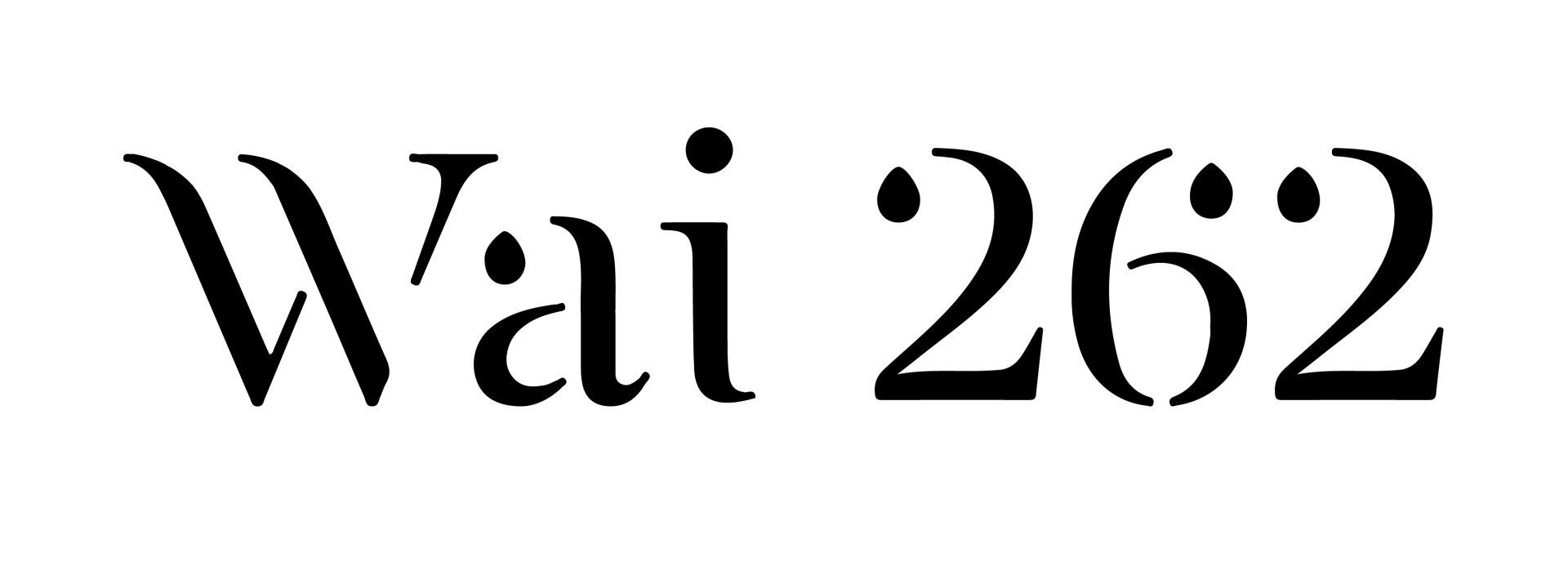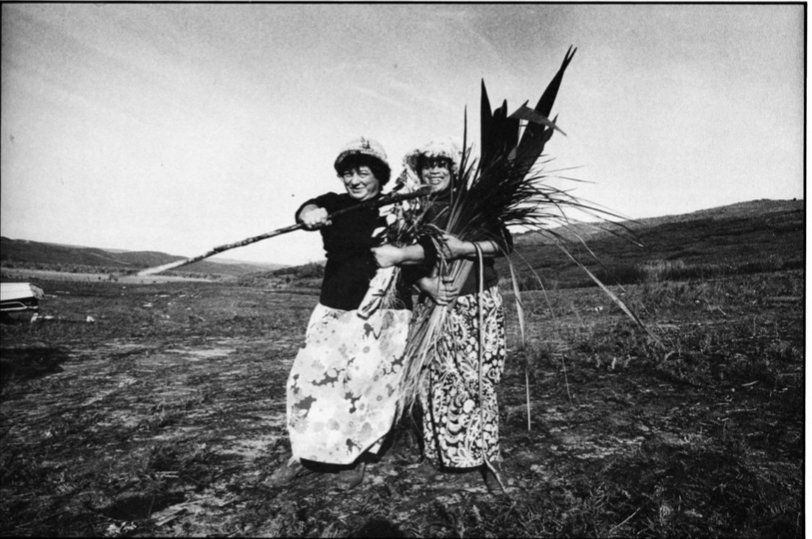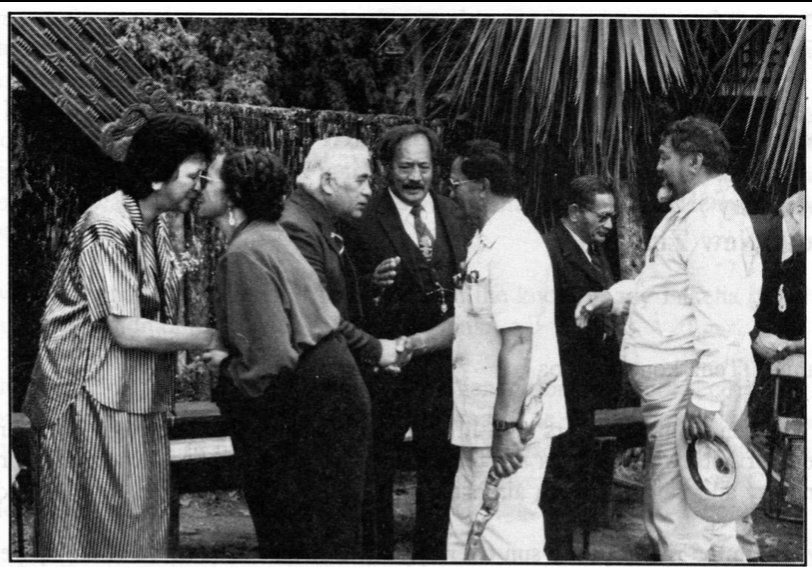Ko Aotearoa Tēnei
The Waitangi Tribunal released its report in 2011 into the Wai 262 claim, recommending wide-ranging reforms to laws and policies affecting Māori culture and identity and calling for the Crown-Māori relationship to move beyond grievance to a new era based on partnership.
Ko Aotearoa Tēnei ('This is Aotearoa' or 'This is New Zealand') is the Tribunal's first whole-of-government report, addressing the work of more than 20 Government departments and agencies.
It is also the first Tribunal report to consider what the Treaty relationship might become after historical grievances are settled, and how that relationship might be shaped by changes in New Zealand's demographic makeup over the next 30 to 40 years.
The Tribunal found that, as a result of historical settlements and the resulting tribal economic renewal, along with growth in the Māori population and other social changes, 'New Zealand sits poised at a crossroads both in race relations and on our long quest for a mature sense of national identity'.
More than 170 years after the Treaty, 'We still seem to bear the burden of mutually felt attitudes from our colonial past', with Māori feeling that their culture is marginalised, while non-Māori fear that Māori will acquire undeserved privileges at their expense.
Yet these fears mask an underlying good will and mutual respect between New Zealand's founding cultures. This has made the process of settling historical grievances possible, and is reflected in the increasing acknowledgement that 'Māori identity and culture is now a vital aspect of New Zealand identity and culture'.
New Zealand, the Tribunal says, is beginning a transition to a new and unique national identity. But for this transition to succeed, 'Over the next decade or so, the Crown–Māori relationship, still currently fixed on Māori grievances, must shift to a less negative and more future focused relationship at all levels.'
The relationship must change 'from the familiar late-twentieth century partnership built on the notion that the perpetrator's successor must pay the victim's successor for the original colonial sin, into a twenty-first century relationship of mutual advantage in which, through joint and agreed action, both sides end up better off than they were before they started. This is the Treaty of Waitangi beyond grievance.'
The Tribunal said that the Treaty envisages the Crown-Māori relationship as a partnership, in which the Crown is entitled to govern but Māori retain tino rangatiratanga (full authority) over their taonga (treasures). This partnership framework provides the way forward for the Crown-Māori relationship.
But, in many respects, current laws and government policies fall short of partnership, instead marginalising Māori and allowing others to control key aspects of Māori culture. This leads a justified sense of grievance, and also limits the contribution Māori can make to national identity and to New Zealand's economy.
Current laws, for example, allow others to commercialise Māori artistic and cultural works such as haka and tā moko without iwi or hapū acknowledgement or consent. They allow scientific research and commercialisation of indigenous plant species that are vital to iwi or hapū identity without input from those iwi or hapū. They allow others to use traditional Māori knowledge without consent or acknowledgement. They provide little or no protection against offensive or derogatory uses of Māori artistic and cultural works.
And they sideline Māori and Māori cultural values from decisions of vital importance to their culture – for example, decisions about the flora, fauna and wider environment that created Māori culture, and decisions about how education, culture and heritage agencies support the transmission of Māori culture and identity. Iwi and hapū are therefore unable to fulfil their obligations as kaitiaki (cultural guardians) towards their taonga – yet these kaitiaki obligations are central to the survival of Māori culture.
Ko Aotearoa Tēnei recommends reform of laws, policies or practices relating to health, education, science, intellectual property, indigenous flora and fauna, resource management, conservation, the Māori language, arts and culture, heritage, and the involvement of Māori in the development of New Zealand's positions on international instruments affecting indigenous rights. These recommendations include law changes and the establishment of new partnership bodies in several of these areas.
These reforms aim to establish genuine partnerships in which Māori interests and those of other New Zealanders are fairly and transparently balanced.
'It is time to move forward,' the Tribunal said:
"As a nation we should shift our view of the Treaty from that of a breached contract, which can be repaired in the moment, to that of an exchange of solemn promises made about our ongoing relationships.
There is a growing community realisation that New Zealand wins when Māori culture is strong. We have an opportunity to take this a stage further through genuine commitment to the principles of the Treaty …
'Such a commitment will not only fulfil – at last – the promise that was made when the Crown and tangata whenua entered their partnership at Waitangi. It will also pave the way for a new approach to the Treaty relationship: as a relationship of equals, each looking not to the grievances of the past but with optimism to a shared future. It is, in other words, time to perfect".
Key Chapters of the
Ko Aotearoa Tēnei Report
-
Chapter 1 : Taonga Works and Intellectual Property
Kaitiaki relationship of taonga species entitles reasonable degree of protection
Kaitiaki rights to genetic and biological resources not akin to Western ownership
Commercial exploitation of mātauranga Māori must give proper recognition to the prior interests of kaitiaki, on a case by case basis
Recommends several changes to bioprospecting, GM, and IP legislation
DOC led bioprospecting regime Joint decision-making with pātaka komiti
No compulsory requirement of access and benefit sharing or prior informed consent
-
Chapter 2 : Genetic and Biological Resources of Taonga Species
Great recognition to Maori interests
HSNO Legislation to recognise and provide for the relationship between kaitiaki and their taonga species
Ngā Kaihautū Tikanga Taiao to retain role and appoint two representatives to ERMA
Ngā Kaihautū should give advice when they believe it is relevant to Māori interests
-
Chapter 3 : Relationship with the Environment
Actively protect kaitiaki obligations towards the environment
Reform RMA regime to engage kaitiaki in order to deliver control, partnership, and influence
Enhanced iwi resource management plans delegate control to kaitiaki or establish partnerships
Iwi plans have same RMA status as district or regional plans
Improved mechanisms for delivering control
A commitment to capacity-building
Greater use of national policy statements
-
Chapter 4 : Taonga and the Conservation Estate
Partnership and shared decision-making between the department and kaitiaki
Partnership between DOC and iwi
Treaty principles in General Policies and National Parks
Co-management of customary use
No ownership of protected wildlife
Maori ownership of taonga works derived from natural materials that sustain culture
Reasonable degree of preference in commercial activity on conservation estate
-
Chapter 5 : Te Reo Māori
Revamp Te Taura Whiri at lead agency
Te Taura Whiri functions as a Crown–Māori partnership
Te Taura Whiri have greater powers: to approve plans, curricula and set targets
Te Taura Whiri consults with iwi over local reo plans
Te Taura Whiri monitor progressing carefully every two years
Regions have tino rangatiratanga over kohanga and kura with options to withdraw from national Trust
-
Chapter 6 : When the Crown Controls Mātauranga Māori
Crown Iwi Partnership – Share decision making
Higher Crown Priority
Coordinated and Consistent Agency Policy and Programmes
Māori representation via electoral college
Time and resourcing for meaning Māori involvement
Non-adversarial engagement in setting objectives
Agreed partnership with a willingness to compromise
Adequately resourced agencies to meet time bound objectives
Shared actions and processes of review and evaluation
-
Chapter 7 : Rongoā Māori
Genuine partnership and Crown support of Rongoā and Rongoā Services
Crown acknowledgement and promotion of the role of Rongoa in improving Māori health outcomes
Incentivise health system to expand rongoā services
Te Paepae Matua to play quality-control role
Gather hard data on extent of use and projected demand
The Department of Conservation and the Ministry of Health coordinate over rongoā policy to ensure rākau availability for practitioners.
-
Chapter 8 : The Making of International Instruments
Māori engagement for both binding and non-binding instruments
TPK to coordinate appropriate level of engagement
Engage beyond consultation to negotiations where Māori interest warrants
Crown to identify appropriate representative Māori bodies to engage with (Consideration of Maori electoral college)
Crown adopt policy to fund independent Māori engagement in international forums
Crown adopt a number of accountability mechanisms to Māori

The claimants vision and aspiration seeks to restore “te tino rangatiratanga o te Iwi Māori in respect of flora and fauna and all of our taonga.” Taonga being those things and values which we treasure, material, non-material, tangible and intangible.
Contact Us
Tēna koe, Tēnā koutou
Thank you for signing up to our e-panui for Wai 262 we look forward to keeping you connected to updates and helpful information as we continue the kōrero with community.
If you have any pātai please email
projects@wai262.nz
Please try again later.
Contact Us
Mailing address:
Attn Walter Wells
5399 Far North Road,
Ngataki, RD4, Kaitaia 048
All Rights Reserved | Wai262
Curated by MEA | Website by AWA Digital



